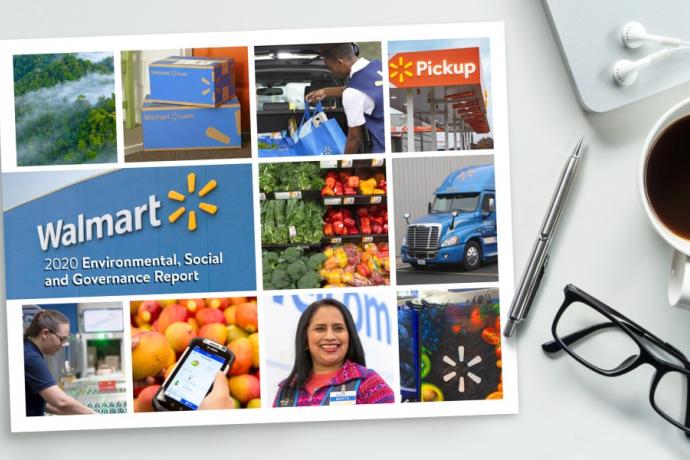Walmart's 2020 ESG Efforts: Making Important Progress Toward Positive Societal, Environmental Change
By Kathleen McLaughlin, Executive Vice President and Chief Sustainability Officer
Published 08-27-20
Submitted by Walmart

I am excited to let you know that today we released Walmart’s 2020 Environmental, Social and Governance (ESG) Report, which covers the fiscal year ending on Jan. 31, 2020 (FY2020).
Because FY2020 ended about six weeks before COVID-19 was declared a global pandemic, the impact of the pandemic is not discussed in this report – yet the pandemic, as well as the sharpening focus on racial inequity following the death of George Floyd and other Black Americans, underscore the need for collective, transformative action on the world's most pressing social and environmental issues.
Walmart takes a shared value, whole-system approach to ESG. Our ESG initiatives aim to go beyond mitigating business risk. We aim to address societal issues through business initiatives that create value for all our stakeholders; and we seek, in collaboration with others, to transform underlying societal systems (such as retail workforce development and food supply chains) for long-term social, environmental and economic sustainability.
As a large multicategory, omni-channel retailer operating in many countries with millions of associates and hundreds of millions of customers, Walmart is often in the news. To help investors and other stakeholders separate signal from noise in assessing our ESG performance, the report describes our aspirations, strategies, practices, challenges and progress on relevant ESG issues and metrics during FY2020. It provides a holistic snapshot of Walmart’s approach to ESG issues as of Jan. 31, 2020 (see these links for more recent information on our COVID-19 response and racial equity initiatives).
With respect to environmental issues, we aim to do more than minimize the environmental footprint of Walmart operations; collaborating with suppliers, NGOs and others, we aim to transform product supply chains end-to-end, industry-wide, for sustainability – reducing emissions, eliminating waste and fostering circularity of packaging and other materials, and sustaining natural resources all along the value chain. Highlights of our environmental efforts in FY2020:
- Climate: Walmart made CDP’s 2019 ‘A List’ for climate action. We reduced emissions in our own operations in line with our science-based targets and used renewable energy sources for an estimated 29% for Walmart’s energy needs globally, on track toward our goal of powering 50% of our operations with renewable energy by 2025. We also made good progress on Project Gigaton, Walmart's global effort to avoid 1 billion metric tons of emissions by 2030, making it one of the largest private sector consortiums for climate action. More then 2,300 suppliers have signed on to Project Gigaton. Suppliers reported 136 million metric tons (MMT) of avoided emissions, which brings us to 230 MMT of cumulative avoided emissions since the program began in 2017.
- Waste: Walmart diverted an estimated 80% of our unsold products, packaging and other operational materials from landfills and incineration globally, as part of our goal to achieve zero waste in our own operations by 2025.
- Natural capital: We made progress on certifications of sensitive commodities; for example, working with suppliers and based on their reported data, approximately 85% of our global private brand palm oil was sourced as RSPO segregated (or equivalent), identity preserved or mass balance, and, as of September 2019, 100% of Walmart U.S. private brand coffee was sourced certified sustainable.
Similarly, we prioritize the social challenges most relevant to our customers, associates, suppliers, people who work in supply chains and live in the communities we serve. Through our jobs, sourcing, relationships and capabilities we aim to create economic opportunity, advance equity, and help strengthen social cohesion. The report describes efforts and communicates our advancements in our work. A few highlights:
- Retail associates: FY2020 marked the fifth year of our efforts to strengthen workforce development practices to help people in frontline retail jobs achieve stability and mobility, not only at Walmart but across the retail and related sectors. The ESG Report discusses these efforts (e.g., strengthened career paths for our own associates, starting wage increases of more than 50% over five years, expanded benefits, the Walmart Academy - which completed over 1 million associate trainings during FY20 alone, to help associates gain skills for advancement, and Live Better U – a pathway to earn a debt-free college degree for $1 a day) and notes that these efforts correlated with upsides in our business. We also hit a milestone this past year in our Retail Opportunity philanthropic program: cumulative investment of $130 million in grants through Walmart and the Walmart Foundation to organizations innovating in the training and advancement of incumbent frontline workers; and engaging over 50 nonprofit organizations in a dynamic community of practice working together to advance economic opportunity for entry-level people in retail and related sectors.
- Pay equity: Fairness in pay is an important issue for our company. We are committed to creating a performance culture where associates are rewarded based on meaningful factors such as qualifications, experience, performance and the type of work they do. We continually review our processes to make sure we are living up to our commitment to fair-pay practices.
- Diversity in leadership: Walmart has long fostered a culture that reinforces respect for the individual and a focus on equal opportunities for all. Between FY2020 and FY2019, the proportion of U.S. management and U.S. officers who are people of color increased. U.S. management of color increased to 35% from 33% and U.S. officers of color increased to 24% from 21%. Walmart's U.S. management is made up of 45% women, which is up from 43% in FY2019. In FY2020, 31% of Walmart's U.S. officers were women, which is down just one percent from FY2019.
- People in supply chains: We believe business should respect human rights, and we aspire to use our capabilities and influence to bring about positive change in retail product supply chains. Through product sourcing, we also aim to create economic opportunity for people. For example, FY2020, Walmart and Sam's Club sourced more than $11.7 billion in goods from approximately 2,900 diverse suppliers in the U.S.
Effective corporate governance is essential to achieving our mission and creating long‑term value. The report describes our commitment to stakeholder engagement; a diverse, high-performing and independent board; executive compensation aligned with long-term value creation; ESG leadership and oversight; robust ethics and compliance practices; and strong corporate citizenship.
Business exists to serve society, and, in turn, serving society strengthens business. The world’s problems demand big solutions and the collaborative efforts of many across sectors to transform systems. Our associates aspire to be part of the solution – to draw on our passion and capabilities to spark the bold, collective action necessary to create a more sustainable and equitable future.
Thank you for your interest in Walmart’s ESG efforts. We welcome you to read our full report and look forward to your feedback – you make us a better company.

Walmart
Walmart
Wal-Mart Stores, Inc. (NYSE: WMT) helps people around the world save money and live better - anytime and anywhere - in retail stores, online, and through their mobile devices. Each week, nearly 260 million customers and members visit our 11,535 stores under 72 banners in 28 countries and e-commerce websites in 11 countries. With fiscal year 2016 revenue of $482.1 billion, Walmart employs approximately 2.2 million associates worldwide.
Walmart continues to be a leader in sustainability, corporate philanthropy and employment opportunity.
Additional information about Walmart can be found by visiting http://corporate.walmart.com, on Facebook at http://facebook.com/walmart and on Twitter at http://twitter.com/walmart.
More from Walmart

